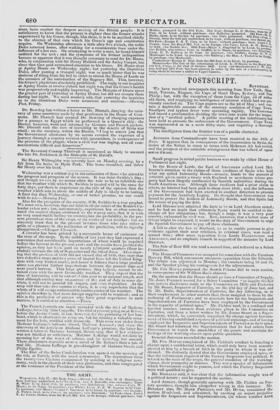Wednesday was a critical day in the estimation of those
who attend to the progress and prospects of the season. It was Saint Swithin's Day ; and though we can by no means allow the rule to be an infallible one that the weather with which St. Swithin is treated will be the same for forty days, yet there is experience on the side of the opinion that the weather which sets in about the middle of July is likely to be lasting. A finer day than Wednesday, or one of better promise, no oue could wish to see.—Morning Post. Alas for the prospects of the country, if St. &within be a true prophet. We must own, however, that our fitith in all the saints of the ROIllish Ca- lendar exists not; but, unfortunately, experience has so often corrobo- rated the ancient rhyme attributed to the watery saint, that it is with no very containable feeling we contemplate the probability, in the pre- sent precarious state of the crops, of six weeks of wet weather : but we sincerely trust that in the present instance those who take either a pride or a pleasure in the realization of the prediction, will be signally disappointed.—Glaseme Chronicle.
A circular has been printed by a mercantile house of eminence on the state of the crops. In the middle of last year they had expressed a conviction that considerable importations of wheat would be required before the harvest in the present year ; and the results have justified the opinion, as duty has 1.1,!en paid on nearly 1,700,01)0 quarters (flour in- cluded) between the 5th of September and the 5th of June. After show- ing that the produce of 1639 did not exceed that of 1838, they state that two defective crops and two years of import have left the United King- dom with very limited stocks, and hence it follows that a large produce alone can prevent further importations between the present time and next year's harvest. This large produce, they believe, cannot be ob- tained even with the most favourable weather. They expect that the time of harvesting will be extetu1.2•1 this year to an unusual length, and that although cutting may co.ninence at the end of July in some dis- tricts, it will not be general till August, and even September. As the crop will thus take two months to ripen, it is very improbable that the whole of it will escape tinfavottrable contingencies of the weather. The opinion therefore is, that more foreign supplies will be required ; and as this is the prediction of parties who have great experience in such matters, it is entitled to attention.—Thees.


























 Previous page
Previous page